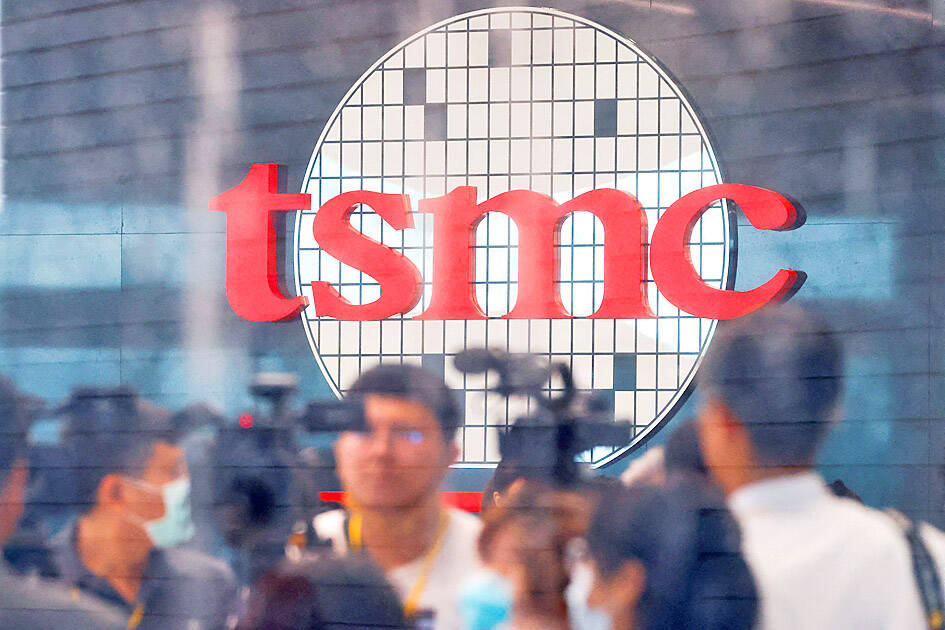Taiwan Semiconductor Manufacturing Co (TSMC, 台積電) yesterday said it has dropped a plan to build a new fab to produce next-generation chips in the Longtan (龍潭) section of Hsinchu Science Park (新竹科學園區) amid local protests over government appropriation of privately owned land for industrial use.
TSMC issued a statement after a self-help group representing some residents of Longtan in Taoyuan, said on Facebook that the world’s biggest contract chipmaker had dropped its new fab construction plan in Longtan after negotiations broke down on Friday.
TSMC had planned to build a factory in Longtan to produce 1.4-nanometer chips, which would be its most advanced chips. Its 2-nanometer chips are scheduled to be available in 2025 and its 3-nanometer chips are already being used in Apple Inc’s latest iPhone 15 series.

Photo: Ann Wang, Reuters
“After evaluation, TSMC is no longer considering establishing a site at phase 3 of the Longtan section under present conditions,” the chipmaker said in a statement.
“TSMC will continue working with the Science Park Administration to evaluate land in Taiwan suitable for building semiconductor fabs,” it said.
It said that it is a tenant leasing land from the science park, while the government is responsible for science park planning.
“TSMC respects the local community and regulatory authorities, and we do not have further comment on land appropriation,” the chipmaker said.
The phase 3 expansion project in the Longtan section of the park would cover 158.59 hectares, about 90 percent of which is privately owned.
Since the expansion project was unveiled in December last year, it has sparked discontent among local residents.
The self-help group has protested the government’s plan to appropriate land.
The group yesterday asked the Hsinchu Science Park Administration to scrap the land appropriation plan entirely, as TSMC would no longer be building its fab in Longtan.
The Ministry of Economic Affairs said that it would help TSMC to find a new location for the fab, as the chipmaker has made it clear that a majority of its capacity would be based in Taiwan and its most advanced chips would be built here, Minister of Economic Affairs Wang Mei-hua (王美花) said.
TSMC told investors early this year that it expected overseas capacity to make up about 20 percent of its total capacity for 28-nanometer and less advanced chips in five years’ time.
The chipmaker is building two advanced factories in Arizona to make 4-nanometer and 3-nanometer chips, while its factories in Japan and Germany are to produce 28-nanometer and 16-nanometer chips to satisfy local demand for automotive chips.

DAREDEVIL: Honnold said it had always been a dream of his to climb Taipei 101, while a Netflix producer said the skyscraper was ‘a real icon of this country’ US climber Alex Honnold yesterday took on Taiwan’s tallest building, becoming the first person to scale Taipei 101 without a rope, harness or safety net. Hundreds of spectators gathered at the base of the 101-story skyscraper to watch Honnold, 40, embark on his daredevil feat, which was also broadcast live on Netflix. Dressed in a red T-shirt and yellow custom-made climbing shoes, Honnold swiftly moved up the southeast face of the glass and steel building. At one point, he stepped onto a platform midway up to wave down at fans and onlookers who were taking photos. People watching from inside

A Vietnamese migrant worker yesterday won NT$12 million (US$379,627) on a Lunar New Year scratch card in Kaohsiung as part of Taiwan Lottery Co’s (台灣彩券) “NT$12 Million Grand Fortune” (1200萬大吉利) game. The man was the first top-prize winner of the new game launched on Jan. 6 to mark the Lunar New Year. Three Vietnamese migrant workers visited a Taiwan Lottery shop on Xinyue Street in Kaohsiung’s Gangshan District (崗山), a store representative said. The player bought multiple tickets and, after winning nothing, held the final lottery ticket in one hand and rubbed the store’s statue of the Maitreya Buddha’s belly with the other,

‘COMMITTED TO DETERRENCE’: Washington would stand by its allies, but it can only help as much as countries help themselves, Raymond Greene said The US is committed to deterrence in the first island chain, but it should not bear the burden alone, as “freedom is not free,” American Institute in Taiwan Director Raymond Greene said in a speech at the Institute for National Defense and Security Research’s “Strengthening Resilience: Defense as the Engine of Development” seminar in Taipei yesterday. In the speech, titled “Investing Together and a Secure and Prosperous Future,” Greene highlighted the contributions of US President Donald Trump’s administration to Taiwan’s defense efforts, including the establishment of supply chains for drones and autonomous systems, offers of security assistance and the expansion of

STREAMLINED: The dedicated funding would allow the US to transfer equipment to Taiwan when needed and order upgraded replacements for stockpiles, a source said The US House of Representatives on Thursday passed a defense appropriations bill totaling US$838.7 billion, of which US$1 billion is to be allocated to reinforcing security cooperation with Taiwan and US$150 million to replace defense articles provided to the nation. These are part of the Consolidated Appropriation Act, which the US House yesterday passed with 341 votes in favor and 88 against. The act must be passed by the US Senate before Friday next week to avoid another government shutdown. The US House Committee on Appropriations on Monday unveiled the act, saying that it allocates US$1 billion for the Taiwan Security Cooperation Initiative